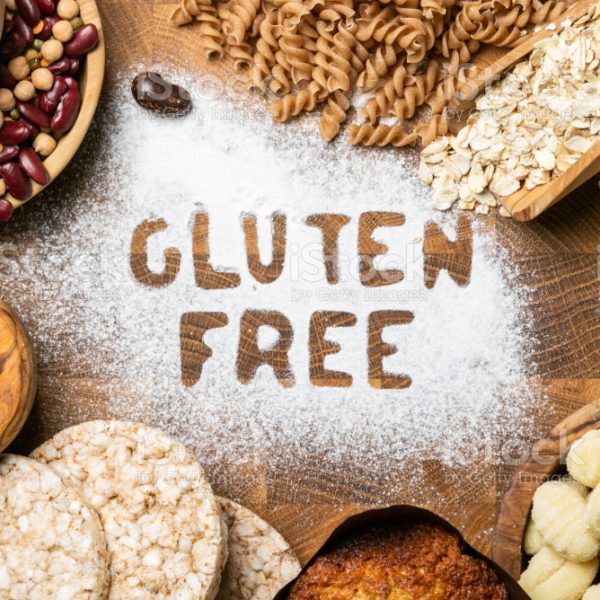If you have Polycystic Ovary Syndrome, aka PCOS, you may already know that deciding what not to eat as a part of your PCOS Fertility Diet is as important as choosing what to eat. Experts agree, wherever you fall on the PCOS spectrum, the right diet can have a great impact when followed consistently. Further, the wrong foods will hold you back from success, or any chance of returning to hormone balance. Many women ask me whether or not it’s a good idea to eat gluten if they have PCOS. This article explores how eating gluten can influence your health and fertility if you have PCOS.
Foods for PCOS- What’s the Story with Grains?
Many women I talk with, start by cutting out all grains from their diet. This is counterproductive! The truth is that it’s an excess of refined carbohydrates – white rice, pasta, processed foods, or baked goods – that contributes to PCOS symptoms and insulin resistance.
When included as part of a balanced PCOS diet, whole grains provide slow-burning carbohydrates that keep your body energized with more stable insulin levels. Whole grains also offer the body valuable vitamins, minerals and fiber.
Gluten May Be a PCOS Trigger
Not all grains are the same, but gluten-containing grains (like wheat, barley, rye, triticale, semolina) can be problematic for some women with PCOS. Nutritionist Melissa Diane Smith suspects that up to 85% of her clients with PCOS suffer from gluten intolerance.
While not every woman reacts to gluten, I believe it’s worth eliminating for 1-3 months to see if your PCOS symptoms improve without it.
Here’s why:
- While not conclusive, animal research finds a high-gluten grain diet is linked to insulin resistance, higher blood pressure, and higher C-reactive protein levels (linked to heart disease). (BMC Endocrine Disorders, 2005).
- For many people, gluten is hard to digest, creating symptoms like bloating, gas or indigestion. Gluten can act as an inflammatory food that weakens the digestive system.
- Studies show women with PCOS already have a lot of inflammation in their bodies from low-grade oxidative stress, increased C reactive protein levels, advanced glycation end products (AGE’s)*, and more. (Fertility & Sterility, 2012).
- For women with PCOS in a heightened state of inflammation, eating gluten-containing foods can worsen their symptoms if they are also gluten intolerant.
*“Advanced glycation end products (AGEs), also known as glycotoxins, are a diverse group of highly oxidant compounds with pathogenic significance in diabetes and in several other chronic diseases.” (Journal of the American Dietetic Association)
Do You Have Signs of Gluten Intolerance?
Important: Gluten intolerance results from an inability to digest gluten well. Weakened immune response and poor digestive health are often at the root of this issue. Celiac disease is different. It results from an allergy to gluten and requires a blood test for diagnosis.
Look for the following gluten intolerance symptoms, which often occur chronically or after eating gluten foods:
|
|
Try Gluten Free and See How You Feel
PCOS symptoms are diverse, yet naturopaths, herbalists and nutritionists help their clients manage them in a similar way – encouraging a PCOS Diet free of gluten, inclusive of gluten-free whole grains like quinoa, brown or wild rice, amaranth or teff.
It’s important to read labels carefully when avoiding gluten! Gluten is not just in grains like wheat, barley and rye. It’s present in condiments, sweets, alcoholic drinks, processed meats, marinades, soups and more. Oats are another gluten-reactive food unless they are certified gluten-free. Coffee (unless organic, whole bean) can trigger symptoms for people, too.
While you may not need to eliminate gluten forever, cutting it out for 1-3 months can be an enlightening experience. You may find you feel better, have more energy, easier digestion, and find weight management and blood sugar balance a bit easier.
Give a gluten-free lifestyle a chance as you begin to rebalance. Many gluten-containing foods are a poor choice for PCOS anyway, and the body often recovers faster on a PCOS-friendly diet including gluten-free, whole grains.
- Duleba, Antoni, M.D. et al. (2012, Jan.). Is PCOS an Inflammatory Process? Fertility & Sterility. 97(1): 7–12. doi: [10.1016/j.fertnstert.2011.11.023] Retrieved from: https://www.ncbi.nlm.nih.gov/pmc/articles/PMC3245829/
- Jacob, Aglaee. (2017, July). Grain Free Diet for PCOS. Retrieved from: https://healthfully.com/418637-grain-free-diet-for-pcos.html
- Jonsson, Tommy et al. (2005, Dec.). Do evolutionary lectins cause insulin resistance? Agrarian diet and diseases of affluence. BMC Endocrine Disorders. 2005; 5; 10. doi: [10.1186/1472-6823-5-10]. Retrieved from: https://www.ncbi.nlm.nih.gov/pmc/articles/PMC1326203/
- Grassi, Angela, BS, RDN, LDN. (2018, Sept.). Gluten & PCOS: Is There a Connection?
Retrieved from: https://www.verywellhealth.com/gluten-and-pcos-is-there-a-connection-2616491 - Medling, Amy. (2013, March). PCOS, Gluten & Fertility. Retrieved from: https://pcosdiva.com/2013/03/pcos-gluten-fertility/
- Uribarri, J., Woodruff, S., Goodman, S., Cai, W., Chen, X., Pyzik, R., Yong, A., Striker, G. E., … Vlassara, H. (2010). Advanced glycation end products in foods and a practical guide to their reduction in the diet. Journal of the American Dietetic Association, 110(6), 911-16.e12. Retrieved from https://www.ncbi.nlm.nih.gov/pmc/articles/PMC3704564/





